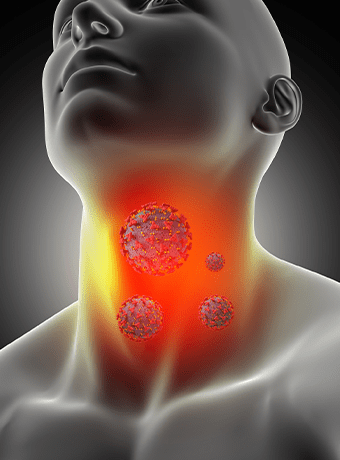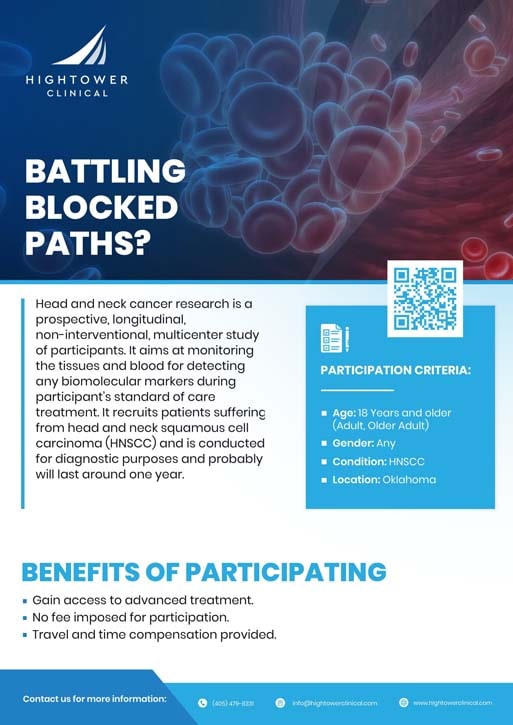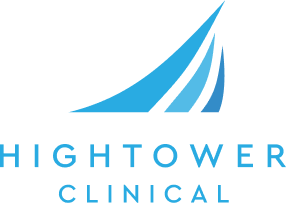Symptoms include persistent sore throat, lumps in the neck, difficulty swallowing, and changes in voice or unexplained weight loss.
Head and Neck Cancer Biorepository Clinical Trials in Oklahoma City, OK
Join our head and neck cancer biorepository clinical trials in Oklahoma City, OK as your participation can help improve treatment and find better health outcomes for many.
Enroll Now
Suffering from head and neck cancer?
You might be eligible for our head and neck cancer biorepository clinical trials.
Head and neck cancer, which affects your oral cavity, throat, and larynx, remains a main health concern for both men and women globally. Multiple treatment options are available yet there is a void for a better and effective therapeutic option to enhance the quality of life for those affected by this condition.
Hightower is currently conducting head and neck cancer biorepository clinical trials in Oklahoma City, OK for participants with HNSCC. The participants will undergo tissue and blood tests to analyze molecular biomarkers during their regular treatment.
Taking part in the clinical trial is free and completely up to you.
To join, just fill out the form, and a member of our research team will contact you to see if you’re eligible for the study.
Cancer Bio Repository
| Study Name | Protocol Number | Sponsor |
|---|---|---|
| Head and Neck | Tempus |
About Head and Neck Cancer Biorepository Clinical Trials
Hightower is currently conducting biorepository clinical trials for individuals with head and neck squamous cell carcinoma (HNSCC). Participants will have tissue and blood samples collected to analyze molecular biomarkers as part of their standard treatment.
This trial is a prospective, longitudinal, non-interventional, multicenter study of individuals with HNSCC. The head and neck cancer biorepository clinical trials in Oklahoma City, OK aim to conduct molecular biomarkers profiling during participants’ standard of care treatment.
The study aims to monitor biomarkers in a targeted patient population with metastatic or unresectable, recurrent HNSCC and aims at first-line immunotherapy or combination therapy.
*All study procedures, including the study-related treatment and the investigational drug, are provided at no cost, and no insurance is needed to join.
*The study doctor will guide you through each step of the clinical trial, addressing any questions you may have about the treatment before you decide to participate.
Biorepository Research: What to Expect?
Once you agree to enroll in our study, you will be asked to sign an Informed Consent Form, which provides detailed information about the study. Our research team will guide you through the study process and explain your role in the trials. We encourage you to ask any questions you may have before deciding whether to participate or withdraw from the trial.
After signing the consent form and addressing all your questions, there will be timely blood sample collection and regular monitoring.
This study involves up to 500 participants with head and neck cancer (HNSCC) located in areas such as the throat, voice box, mouth, or oropharynx. These participants will receive either their first round of immunotherapy or a combination of therapies.
*Study-related care is provided free of charge, and experienced physicians will conduct thorough physical exams and assessments throughout the process.


Age
18 years and older
Gender
All
Condition
HNSCC
Current Status
Recruiting
What Happens in HNSCC?
HNSCC is a type of cancer that develops in the mucosal surfaces of the head and neck, such as the mouth, throat, and larynx. The main culprits behind them are risk factors like tobacco use, alcohol consumption, or HPV infection.
Complications
- Cancer can invade nearby structures like jaws, sinuses, or even the spinal cord.
- In advanced stages, HNSCC may spread to distant organs, such as the lungs, liver, or bones.
- Tumor growth in the throat can block or narrow the passage, making it hard to swallow.
Symptoms:
- Persistent sore throat or hoarseness: A sore throat that doesn’t go away or a change in voice.
- Unexplained weight loss: Sudden, unintentional weight loss is common in HNSCC.
- Lumps or swelling in the neck: A noticeable lump or swelling in the neck area, particularly if it doesn’t go away.
- Difficulty swallowing (dysphagia): Many people with HNSCC report feeling like something is stuck in their throat or experience pain or discomfort while swallowing
- Non-healing ulcers or sores in the mouth or throat: Any sore, ulcer, or white patch in the mouth or throat that doesn’t heal within a few weeks.
Frequently Asked Questions
How is head and neck cancer diagnosed?
It is diagnosed through physical exams, imaging tests (like CT or MRI scans), and biopsies to check for cancerous cells.
What are the treatment options for head and neck cancer?
Treatment options include surgery, radiation therapy, chemotherapy, and targeted therapies depending on the cancer stage and location.
What happens during head and neck cancer clinical trials?
Participants receive investigational treatments, and their response is monitored to evaluate safety and effectiveness in improving health outcomes.
Why participate in head and neck cancer clinical trials?
Participation offers access to new treatments and contributes to research that may improve future care for others with head and neck cancer.




